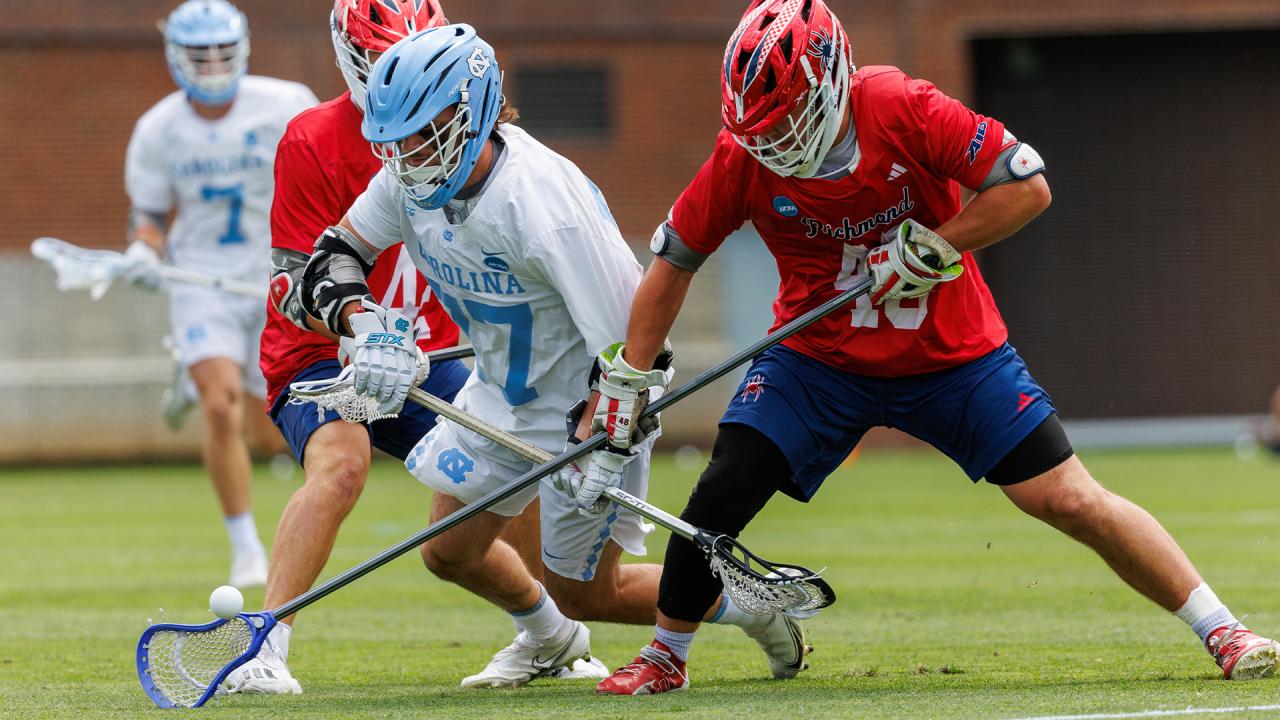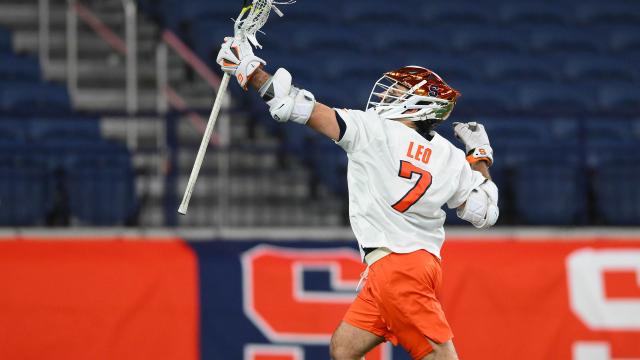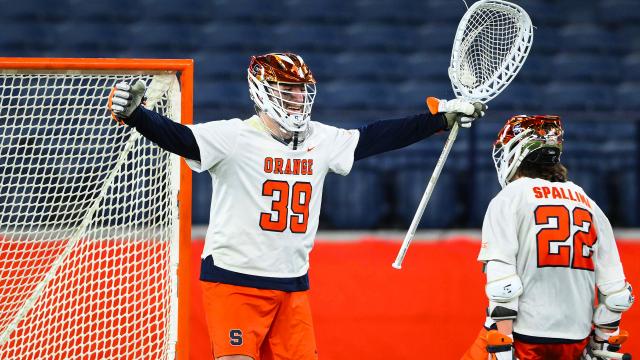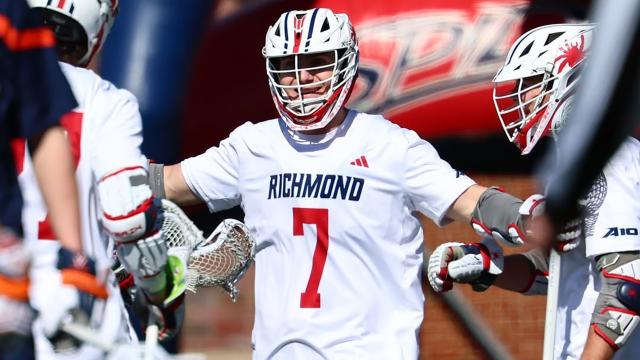
Chemotti, Richards Agree: It's Always Been About Defense at Richmond
Richmond goalie Zach Vigue, a third-year starter and graduate student who anchors another strong defense that has been the backbone of the school’s Division I program since its inception in 2014, occasionally still gets razzed by his defensemen.
Even after being selected twice as the Atlantic 10 goalkeeper of the year, even after being named an honorable mention All-American, even after the Spiders, who are participating in their sixth NCAA tournament, celebrated their first victory in the dance — a come-from-behind, first-round, 13-10 takedown of No. 8 seed North Carolina in Chapel Hill last week — the needling continues.
“Some of the guys still bust on me about averaging only eight saves a game,” said Vigue, who responds to the playful taunts by paying them quite the compliment. “I tell them if they want me to make more saves, then let me see more shots!”
Vigue has a point, and he is not complaining. The Richmond (14-3) defense, which will tangle with top-seeded, top-ranked Cornell (15-1) and its explosive offense in the quarterfinal round on Saturday, has consistently prevented opposing offenses from getting into a comfort zone, as they search for high-percentage looks at the Spiders’ cage.
Through 17 games, Richmond opponents have taken only 484 shots and scored 134 goals — good for 27.7 percent shooting. By comparison, the Spiders offense has shot 31 percent by scoring 234 goals on 756 shots. The Spiders average 44.5 shots, while giving up an average of 28.5 shots. Richmond’s 452 shots on goal far outdistance their opponents’ 279.
Richmond’s 14 victories are the most in a single season in school history.
Over the years, unseeded Richmond often has ranked among the top 10 teams in the nation in scoring defense. The Spiders currently rank second in the country, having allowed just 7.88 goals per game.
“It is tough to score on us, especially in six-on-six,” Vigue said. “Everybody on our defense knows their job and where they fit into our puzzle. Our guys are so aggressive. They fly around and support each other so well. They have their [individual] niches. They funnel lots of shots down the alleys and give me shots I should save.”
Vigue fully understands and appreciates his good fortune as Richmond’s last line of defense. The Spiders, since 2023 a member of the A-10 after dominating the Southern Conference for much of their 12 D-I seasons, steadily have built and maintained their reputation as a stingy D.
That unit features two more honorable mention All-American close defensemen in junior Hunter Smith and graduate transfer Mitchell Dunham.
Smith, who regularly covers opponents’ best dodging attackmen, was named A-10 co-Defensive Player of the Year and has been honored in back-to-back seasons as an All-Conference first team member. He has been a starter since winning the job during his freshman season. It is unusual for Smith to require defensive help in coverage.
“We could never slide to Hunter, and we’d be OK,” Vigue said.
Dunham, 6-feet-5 and a former Defensive Player of the Year in the MAAC for Mount St. Mary’s, has made the most of his fifth year with an extremely disruptive season.
Dunham has collected 50 ground balls, the most among Spiders defensemen. He also has dazzled by causing 38 of Richmond’s 190 caused turnovers (11.2 per game). Dunham ranks third in D-I and second on Richmond’s single-season caused turnover record list. He is an imposing figure in the top middle of Richmond’s zone alignment.
He was selected by Utah as the 21st overall pick in the Premier Lacrosse League College Draft.
“[Dunham’s] stick is always in the [passing] lane, always in the right spot,” Smith said. “He has brought a whole new level to our defense.”
“When I entered the portal at the Mount, I knew Richmond was a buttoned-up defense, year in and year out,” Dunham said. “I was nervous in the beginning, not knowing how I’d fit in with the team and the culture. They welcomed me with open arms, and I started learning the defensive terminology. By the end of the fall, we knew we could so something special this year.”
In addition, a strong rope unit is led by senior LSM and defensive captain Tommy Stull, who has performed tremendously as a defender and faceoff wingman. The All-Conference first team threat has picked up 53 ground balls, second on the team.
Dan Chemotti, the only head coach the Spiders have had — the same goes for defensive coordinator Paul Richards — said he committed early on to building the Spiders with a solid, defensive foundation.
“We knew we couldn’t bring in 40 freshmen in year one. We also knew if we focused on offense, we would be hemorrhaging goals. We tried to find the best defensemen available,” said Chemotti, who found talents such as defensemen Ryan Dennis and Brendan Hynes and goalie Benny Pugh, who, as a senior in 2017, was recognized as the NCAA Goalie of the Year.
“Coach Richards has built these guys into something special every year,” Chemotti said. “Zach [Vigue] plays at a tremendous compete level. Hunter [Smith] is such a student of the game. He knows every detail about the guy he is going to cover. Mitch [Dunham] is a mountain of a person to get around, with a magical stick. He is very frustrating to go against in practice because he knocks down so many passes.”
“Tommy [Stull] has stats that tell his story, but what he brings to the table [as a captain] with his messaging and leadership — he is way ahead of any other seniors we’ve had, in terms of how dialed-in on an opponent he is. When the seniors meet every Monday morning, his voice is like having another member of the coaching staff in the room.”
The Spiders are riding at a high confidence level, and with good reason.
In addition to their defensive prowess, the Spiders have been graced with excellent balance. Their offense — behind All-American honorable mention attackman Aiden O’Neill and midfielder Max Merklinger and All-League second team attackman Lucas Littlejohn — ranks eight in the nation in scoring (13.76 goals per game).
Back on March 2, Richmond, for the first time ever, faced the Big Red, led by heavy Tewaaraton Award favorite C.J. Kirst at attack. The Spiders’ defense gave Cornell fits. Richmond surprisingly led for much of the contest, before Cornell’s late 4-0 run produced a 12-11 victory.
Cornell leads the nation handily in scoring offense. The Big Red average 16.38 goals per game.
In 2025, the Spiders have surrendered 10 goals or fewer on 13 occasions — and have won every time. Ten times Richmond has held opponents to single digits.
This season, the repeat and undefeated A-10 champions have arguably faced their toughest non-conference slate ever. And the Spiders have more than held their own.
Richmond has beaten five ranked teams, including Virginia, Georgetown, North Carolina, UMass and Saint Joseph’s. The Spiders have dropped one-goal decisions to Cornell and Duke, which held on for a 13-12 win after a furious second-half comeback by the Spiders.
A season-opening, 12-7 loss to Maryland on February 1 is the other blemish.
“Every year, I feel like I have had to do or say less [teaching man-to-man and zone principles]. The chemistry we have on defense has been passed on for years,” Richards said. “It’s about players really taking ownership of the defense. Take a guy like Tommy, who has played through injuries all season. He sets the tone for our expectations. He’s just a dog, a grinder. After we won the A-10 championship this year, we had to ask him to smile. All he wanted to do was win the next one. That’s how he practices every day. That is us.”
The signs of something special were palpable during the Carolina win, the biggest in school history.
The Spiders started in a hole that did not fit their identity. For most of the first half, due in part to five failed clears in the face of the Tar Heels’ strong ride — by a Richmond squad that entered the NCAA tournament ranked second in D-I with a successful clearing percentage of 92 — the Spiders barely possessed the ball. Carolina’s offense built a 4-0 lead.
Richmond switched to a zone defense near the end of the first quarter. It slowed the Tar Heels’ momentum. The Spiders’ defense buckled down. The offense gradually woke up. Twenty-four minutes into the first half, Richmond got its first goal. The Tar Heels held just a 5-2 lead at halftime.
Richmond responded quickly by upping their pace of play and began to hunt down the Heels. The Spiders got their first lead with seven minutes left in the fourth quarter at 11-10. They closed with four unanswered goals to complete an impressive second-half by outscoring Carolina 11-5.
“There were certainly some nerves early, but everybody on the sidelines and on the field was calm and composed. Nobody ever wavered,” Richards said. “The composure of the seniors and other guys showed. They allowed us to rebound from one of our worst halves. This is the most confident group we have had.”
Vigue agreed, as he eyed the Big Red.
“Making history for the program is an awesome feeling. But for us, the bigger thing is moving on to the next one,” Vigue said. “Getting to play a team like Cornell is great. We probably should have won the first time. Now we have a chance to show that game wasn’t a fluke.”
Gary Lambrecht
Related Articles





